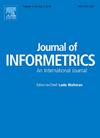鉴定期刊排名中的家乡偏见
IF 3.5
2区 管理学
Q2 COMPUTER SCIENCE, INTERDISCIPLINARY APPLICATIONS
引用次数: 0
摘要
期刊评价对科学研究至关重要,影响学术评价、期刊声誉和科研人员的发展。然而,不同国家期刊质量评估的显著差异往往包含“本土偏见”。为了识别这种偏见,我们提出了一种基于瓦哈卡-布林德分解的改进方法,该方法传统上用于分析工资差距和歧视。我们采用加权平均百分位(WAP)方法来整合来自多个国家的期刊排名,从而反映了全球视角下的评价共识,而不是依赖于只考虑单个国家期刊排名的假设无歧视状态。此次修订调整了期刊评估方法,对学术市场预期提供了更全面、更平衡的评估,并使其在期刊评估过程中更接近无偏见状态。我们的分析纳入了四个国家期刊列表,共包括1188种精选期刊。我们发现,来自英国(UK)组织的商学院协会(ABS)名单表现出“本土偏见”,偏爱国内期刊,低估国外期刊。这种偏见可能影响全球学术交流和期刊评价的公正性。在使用期刊列表时,认识到这些国内偏见和跨国限制是至关重要的。本文章由计算机程序翻译,如有差异,请以英文原文为准。
Identification of home bias in journal ranking lists
Journal evaluation is essential for scientific research, influencing academic assessment, journal reputation, and the development of researchers. However, significant differences in journal quality evaluations across countries often contain ‘home bias’. To identify this bias, we propose an improved method based on the Oaxaca-Blinder decomposition, which has traditionally been used to analyse wage gaps and discrimination. Rather than relying on a hypothetical non-discrimination state that considers only the journal rankings of a single country, we employ the Weighted Average Percentile (WAP) approach to integrate journal rankings from multiple countries, thereby reflecting the evaluation consensus from a global perspective. This revision adapts the methodology to journal evaluation, offering a more comprehensive and balanced assessment of academic market expectations, and bringing it closer to an unbiased state in the journal evaluation process. Our analysis incorporated four national journal lists, comprising a total of 1,188 selected journals. We find that the Association of Business School (ABS) lists from the United Kingdom (UK) organizations exhibit 'home bias', favouring domestic journals and undervaluing foreign ones. This bias may impact the fairness of global scholarly communication and journal evaluation. Recognizing these home biases and transnational limitations is crucial when using journal lists.
求助全文
通过发布文献求助,成功后即可免费获取论文全文。
去求助
来源期刊

Journal of Informetrics
Social Sciences-Library and Information Sciences
CiteScore
6.40
自引率
16.20%
发文量
95
期刊介绍:
Journal of Informetrics (JOI) publishes rigorous high-quality research on quantitative aspects of information science. The main focus of the journal is on topics in bibliometrics, scientometrics, webometrics, patentometrics, altmetrics and research evaluation. Contributions studying informetric problems using methods from other quantitative fields, such as mathematics, statistics, computer science, economics and econometrics, and network science, are especially encouraged. JOI publishes both theoretical and empirical work. In general, case studies, for instance a bibliometric analysis focusing on a specific research field or a specific country, are not considered suitable for publication in JOI, unless they contain innovative methodological elements.
 求助内容:
求助内容: 应助结果提醒方式:
应助结果提醒方式:


